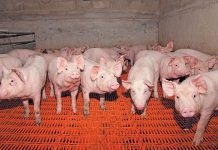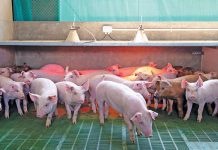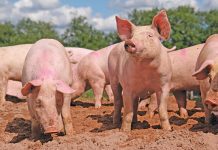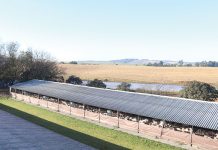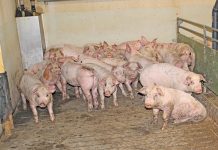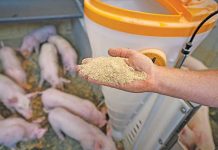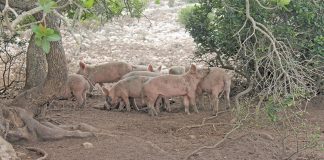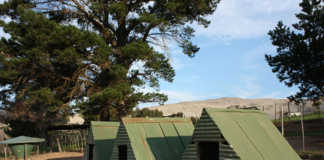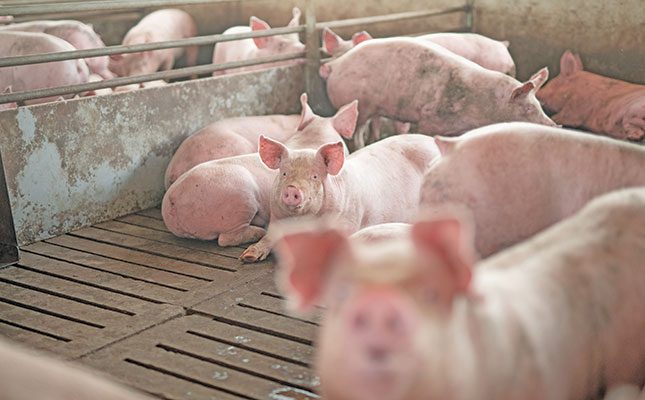
Photo: Supplied
Please give us an overview of the South African pork industry as it currently stands.
South Africa currently produces 3,8 million carcasses per year. According to the data of the South African Pork Producers’ Organisation’s (SAPPO) members, there are around 125 000 sows in South Africa.
In terms of the volume produced in South Africa, pork is a relatively small component of animal protein, compared with beef and poultry, for instance. We have around 550 registered pig producers that operate on the formal market.
Of these, around 120 produce 95% of South Africa’s total pork volume on the formal market.

Can you elaborate on the informal pig sector?
The pork industry in South Africa is dualistic: we have a formal sector and an informal sector. For the latter, pigs are not necessarily taken to an abattoir for slaughtering, for instance.
The informal sector is thus unregulated, and may include smallholders or subsistence farmers that have a couple of sows in their backyards. In terms of numbers, we estimate that there are around the same number of sows in the formal sector as in the informal sector.
The formal sector is a high-risk, low-cost, but high-profit industry. Pigs in the informal sector are mostly free range, and farmers rely on little infrastructure to keep their pigs. In some cases, farmers may have some areas of shelter for their pigs, but there are no pig houses and so start-up costs are very low. Pigs are fed waste from kitchens, which means that input costs are also very low.
The challenge we face with the informal market is that it cannot be regulated.
There is huge demand for fresh meat in townships, and the informal sector is very vibrant. Farmers here contribute hugely to food security in South Africa, and their contribution must not be underestimated.
While the informal industry cannot be regulated, it can be positively influenced, and this is what SAPPO is actively trying to do. In one instance, for example, we paid far more than the market price for some pigs produced by informal producers to cull them to stop the spread of African swine fever (ASF).
Can biosecurity be implemented in the informal sector?
Due to a lack of fencing and capital, informal producers cannot fully play in the biosecurity space. This has an impact on South Africa’s entire pork industry (formal and informal), as a lack of biosecurity could lead to the spread of significant diseases that could threaten the national herd.
The challenge here is that informal producers do not produce at scale to justify implementing biosecurity on their land.
Another challenge is that informal producers’ pigs tend to roam, as there are no boundaries or fences. So, even basic biosecurity measures cannot be enforced. Remember that the informal sector is only profitable because input costs are very low. As soon as these farmers begin feeding their pigs feed, instead of waste, for example, the profit margin begins to shrink.
Why are we currently seeing an increase in ASF cases?
There are a few reasons, but the major ones are growing urbanisation, a lack of basic services, and a lack of biosecurity in the informal sector. As people move to cities from rural areas, they may take a few pigs with them. The movement of these animals is unregulated, and so it is very difficult to trace the occurrence of any illness.
Failing services also means that pigs that are roaming freely are consuming waste, which can lead to the spread of ASF. As mentioned before, there is no biosecurity in the informal sector, and so animals are constantly in contact with each other. This is also a major source of ASF infection.
What is SAPPO doing to improve production in the informal pig sector?
We recognised that there was a serious information gap when it comes to informal producers. We have therefore embarked on information and influence campaigns to train and teach informal producers in pork production.
For instance, we utilise virtual training programmes, such as videos, to offer producers information and practical advice on farming pigs. Before the most recent AFS outbreaks, we were also training around 200 to 250 people every year. This was paid for by the trainees and subsidised by SAPPO. This included practical training on member farms.
However, with the AFS outbreaks, we’ve had to stop these training programmes to prevent the spread of the disease. These practical sessions are now also run online.
We also have a mentorship programme, in which we mentor around 80 farmers. We visit these farmers on a monthly basis. In this programme, we aim to not only train the farmers in terms of practical production, but we also focus on the business side of pig production to help them develop their own businesses.
In this programme, we also have veterinarians that are allocated to the mentorship farms. These vets offer advice and check on the overall health of the farmers’ animals.
We also have farmers’ days during which we link farmers with suppliers. We also have experts that speak to delegates during these days about, for instance, why an abattoir may reject certain pigs, and how farmers should inject their animals.
We have also entered into an agreement with the Western Cape government in which we help upskill their extension officers. In this regard, we have launched an app that traces the movement of these extension officers, and indicates what farms have been visited.
Through this initiative, we hope to empower extension officers, who are vital for the informal agriculture sector, and to scout for possible disease outbreaks.
How did the listeria outbreak in 2018 impact the local pork industry?
The listeria outbreak hit us as an industry, without us being guilty. It is important to note that listeria was found in processed meats, such as polony, of which pork only constitutes around 2%. Moreover, listeria was found in the casing of polony, and not in the meat itself.
However, as a result of the outbreak, government ruled that all cured meat had to be removed from all retailers. This had a serious impact on pig farmers, as the price for pork dropped from R30/kg to R10/kg. Small-scale farmers were most seriously hit by this.
At some point during the outbreak, SAPPO had to accept that the listeria outbreak and government’s response to it was not something we could manage. The outbreak forced us into a corner, but many opportunities arose during this time.
We also learnt that risk management is essential for success in pig farming. It is important for pig farmers to recognise challenges to the industry and the risks, but then to also identify the opportunities in these challenges. We can’t fix outside risks, but we can manage them.
It is really all about mindset and attitude. Farmers need to set goals for their operations, and then figure out how they are going to get there. This has become a major driver for SAPPO.
What is SAPPO doing in terms of promoting sustainable pig production?
We need to change our production practices to ensure the sustainability of the environment and pig production over the long run. This involves the re-evaluation of animal welfare, water use, biodiversity, people management and corporate governance.
In order to do this, we, as farmers, need to ask ourselves some tough questions: what do we have to change in terms of production and the way we do business to become more sustainable and environmentally friendly? It is often very hard to become vulnerable to ourselves and answer these questions, but it is essential for the future success of each farmer’s operation.
What are the challenges SAPPO is currently facing in terms of consumer backlash?
We have two big challenges in this regard: one, the perceived value of pork; and two, consumers’ understanding of agriculture and pig farming. Part of the reason for consumers’ lack of knowledge and understanding is that fewer people are growing up being exposed to farms.
Even fewer people are exposed to the formal pork sector, and the informal pork sector may give consumers an inaccurate image of pork production in South Africa.
This is why SAPPO has been actively involved in changing this perception of pig farming through showing consumers footage of authentic pig production in the country. We have released video footage showing real pig farmers at work, and how they treat their animals and what they are doing to ensure the sustainability of their farms and the environment.
Through these videos, we hope to build a bridge between consumers and farmers. We also hope to show consumers that pork is safe to eat, and that pigs are treated humanely on pig farms.
Our Pork 360 initiative, for example, which has 92 000 registered sows, is an industry discipline, accredited by an international company. It was launched around 14 years ago, and aims to set an industry standard in terms of animal welfare and hygiene.
Pork is an important protein source because it is affordable, especially compared with red meat.
As consumer spending is under more and more pressure, we hope that consumers can begin appreciating pork for the value it provides: affordable protein, rich in nutrients, which is also very tasty and versatile!
Do you believe there is a bright future for South Africa’s pig production?
South Africa’s formal pig farmers are some of the best in the world and are exceptional at implementing biosecurity. Despite the fact that ASF is endemic to the region, we have had limited outbreaks of the disease in the formal sector.
This is largely due to farmers’ strict implementation of biosecurity. They have done a remarkable job at controlling and managing the ASF risk. With farmers of this calibre, the South African pork industry is well positioned to thrive.
Phone the South African Pork Producers’ Organisation on 012 100 3035.

